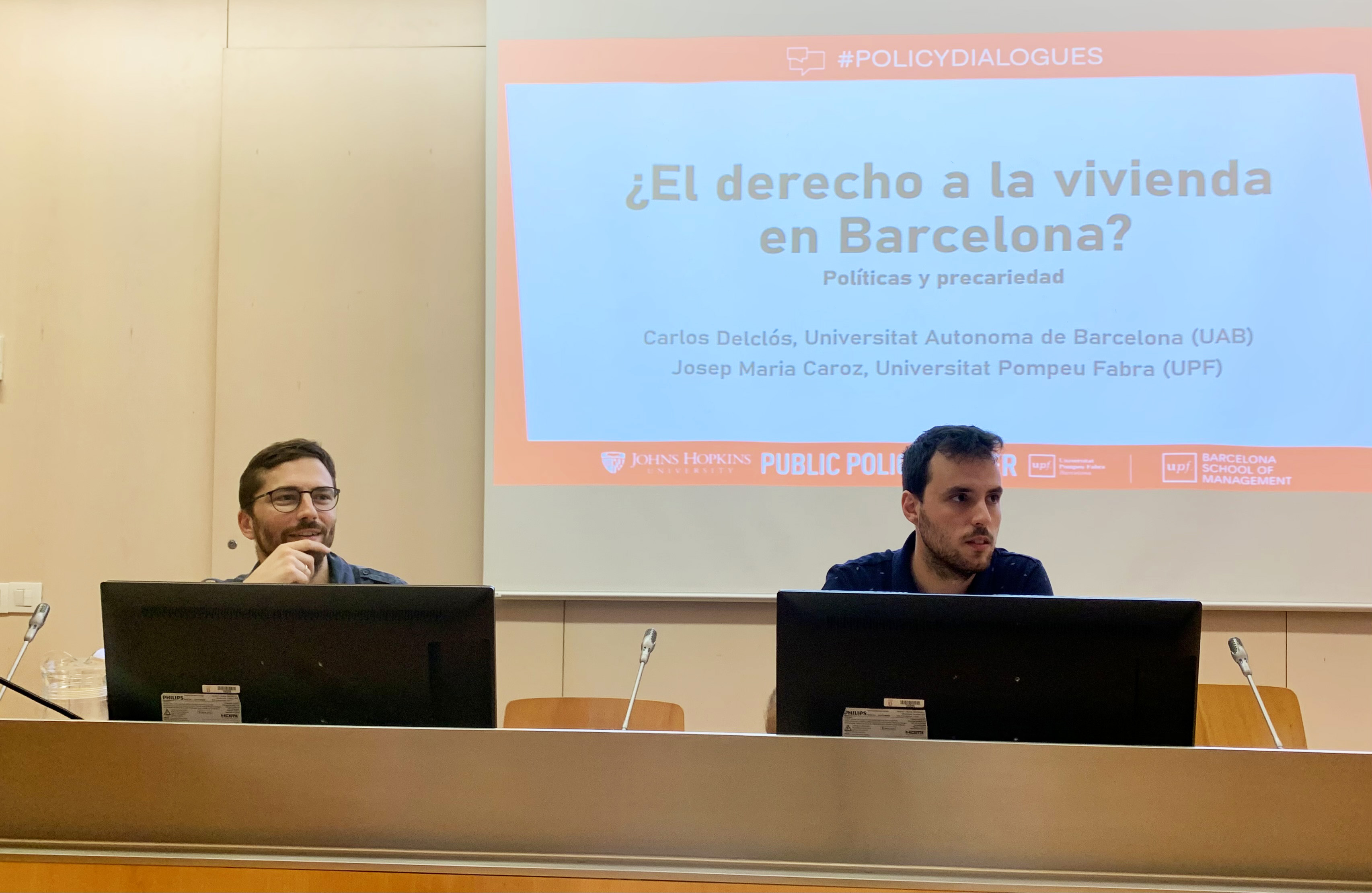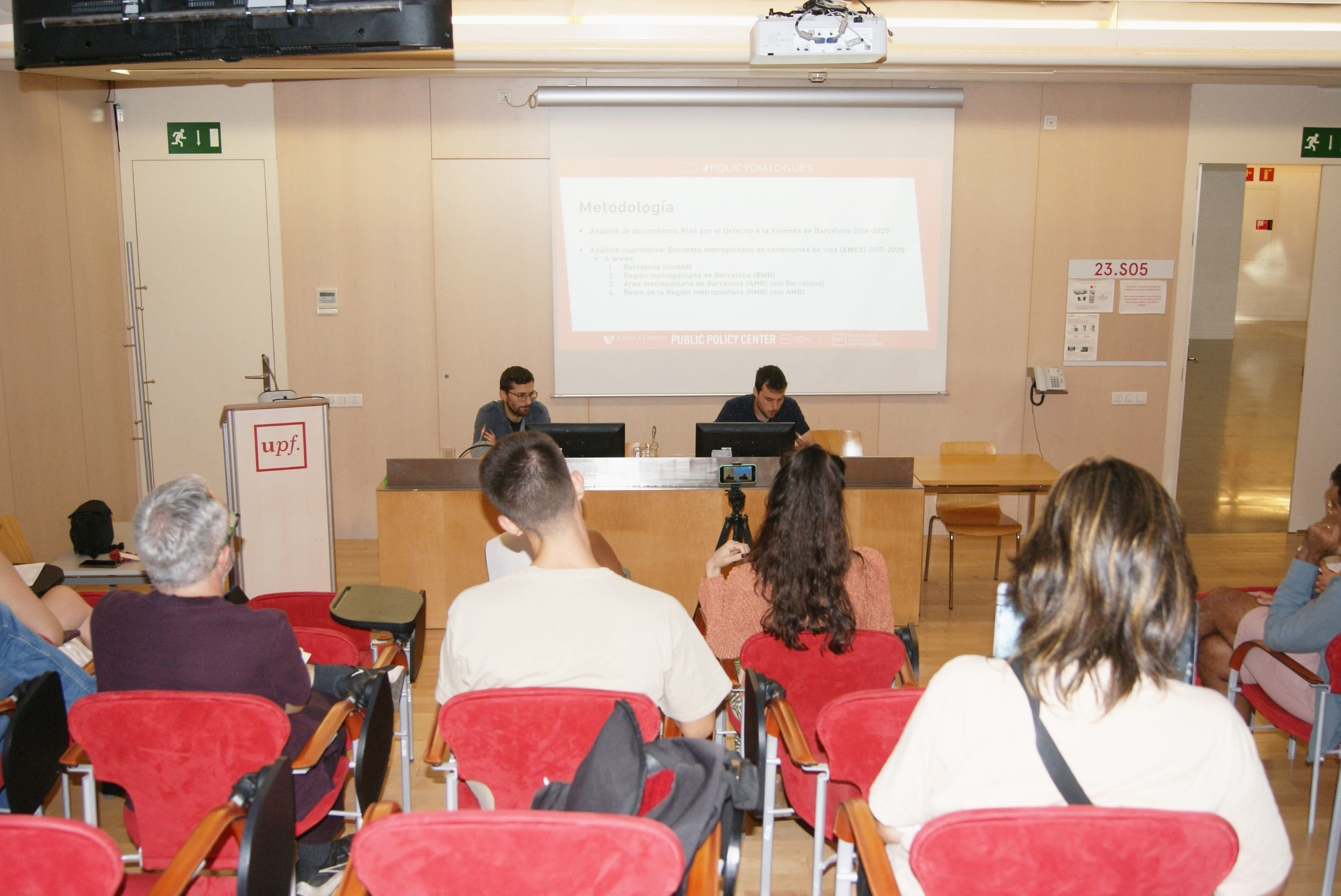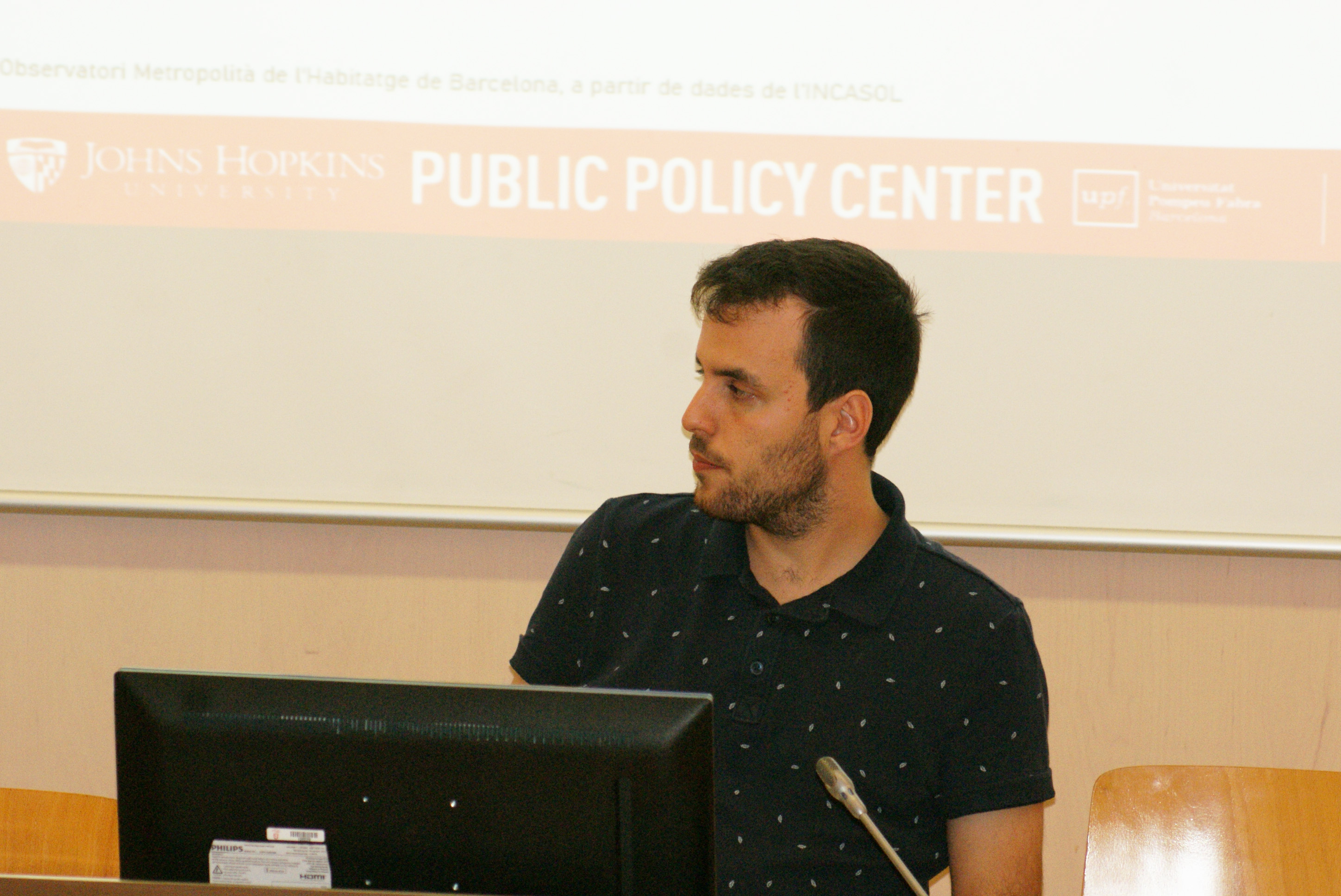“Housing is at the centre of social policies”. Report of the twelfth edition of the Policy Dialogues series
“Housing is at the centre of social policies”. Report of the twelfth edition of the Policy Dialogues series
An in-depth debate on the struggle for the right to housing in the city of Barcelona took place in the twelfth edition of Policy Dialogues, entitled: “The right to housing in Barcelona? Policies and precariousness”. Speakers Carlos Delclós and Josep Maria Caroz, experts on housing and urban inequalities, analysed housing and inequalities in Barcelona from the perspective of residential precariousness and public policies.

In recent years, the right to adequate housing has become a central issue in global public debates, especially with regard to growing social inequality. This phenomenon has its roots in the aftermath of the 2008 Global Financial Crisis (GFC) and its impact on housing systems. The transformation of housing into a commodity subject to the logic of the market, combined with the responses of national governments, which included restrictions on mortgage lending, austerity measures and more flexible working conditions, has had a significant impact on the housing conditions of a large part of the population. For example, in Europe, between 2008 and 2010, around 3.5 million people faced difficulties in meeting their housing payments, whether for rent or mortgage. This phenomenon has led experts and researchers to point to the (re)emergence of what could be called a "global urban affordability crisis", in which the costs associated with housing far exceed wage incomes.
In this global context, the affordability crisis has been particularly evident in Spain over the last decade. The financial crisis and its consequences on the labour and housing markets have had a significant impact in the Spanish economy, triggering a socio-economic crisis of unprecedented proportions, characterised by unemployment, poverty, labour informality, migration and evictions. This crisis led to a major wave of social discontent and social movements, including the Indignados Movement in 2011, resulting in the emergence of movement-led political parties and leaders that put housing squarely at the forefront of political issues regarding inequalities, democracy and justice in Spain. One of these leaders was Ada Colau, who was elected Mayor of Barcelona in 2015 with her platform Barcelona En Comú.
To understand these developments in greater depth, the JHU-UPF Public Policy Center delivered the twelfth Policy Dialogues session, entitled: “The right to housing in Barcelona? Policies and precariousness”. Based on an upcoming report by the two speakers (to be published by the JHU-UPF Public Policy Center), the main objective of this Policy Dialogue was to engage in the issues surrounding the right to housing from the perspective of residential precariousness and public policies in the city of Barcelona. The Speakers were Carlos Delclós, professor at the Universitat Autònoma de Barcelona (UAB), researcher of social change, borders and inequality in urban contexts through socio-demographic analysis and cultural theory and Josep María Caroz, PhD. student in political and social sciences at the Universitat Pompeu Fabra (UPF) in Barcelona, whose doctoral thesis is focused on housing, housing precariousness, inequalities and health. They presented their joint research on the right to decent housing in Barcelona, including an analysis of housing precariousness in the region and of the public housing policies that have been implemented in Barcelona in recent years.
Carlos Delclós opened the session by emphasising that housing is becoming central to debates on inequalities, which in 2023 may seem like an obvious connection but in 2008, for example, was not so clear. Delclós emphasised that, in fact, in the years before the great financial crisis, housing was not seen as a problem, but rather as an opportunity, a kind of social lift for people. But over time, and especially since the impacts of the GFC, it has become evident that the multiple dimensions of inequalities are very closely related to housing.
In the current Spanish context, especially in Barcelona, the right to housing is of special interest because of the change that has taken place in the electoral field over the past decade and the decisions that have been taken about the continuity of certain policies in this area.
Delclós continued his presentation by explaining housing inequality in homeowner societies (those dominated by homeowning tenants, rather than tenants living in private rented accommodation or public housing). He explored how the processes of commodification and financialisation unleashed in recent decades have modified how housing is produced, distributed, financed and consumed, and how these processes have generated social, economic, political and health inequalities.
He explained how housing inequalities exist along four axes: a) tenure regime; b) Age (younger generations, referred to as generation rent, find it more difficult to gain access to home ownership due to increasing unaffordability); c) ethnicity/race (the diminished rates of home ownership of ethnic minorities can be linked in part to socio-economic status, however racialised and migrant populations also suffer from predatory and discriminatory mortgage lending activity); and d) gender, which is clearly reflected in the inequality between men’s and women's property ownership and wealth in real estate, and is the result of economic inequalities caused by discriminatory activities in the rental market and other socio-political spheres.
Housing is also an axis of political inequalities, added Delclós. Home ownership is linked to greater political and civic activity, including greater participation in elections, neighbourhood associations and social mobilisations. And this participation is not neutral, as homeowners are more likely to support conservative parties and anti-redistributive policies, leading to further inequalities. Finally, in terms of health inequalities, home ownership has traditionally been linked to better health status.
In the second part of the session, Josep Maria Caroz explained the objective and methodology of the research: “The general objective…is to study how Barcelona's housing policy has impacted or in some way could influence the general housing context of the city,” he stated. To this end, an analysis was carried out in relation to the housing inequalities and precariousness that exist in Barcelona, in two different phases. The first phase consisted in an analysis of the main municipal housing programme, the Municipal Plan for the Right to Housing 2016-2025, which, although it is dated from 2016, was approved by the Barcelona Municipal Council in 2017.In the second phase, a quantitative analysis of housing precariousness was carried out using data from the Barcelona Metropolitan Living Conditions Survey, which is a specific survey based on the Spanish Living Conditions Survey.
Caroz also highlighted an important point of the research. In addition to using certain typical variables such as housing, ownership structure, tenure structure, they constructed an indicator, based on the literature, of inequalities in housing that aims to reflect what is generally as housing precariousness.
Caroz explained that in order to carry out this analysis, they had used one of the most comprehensive definitions of housing precariousness, coined by Clair et al. (2019): "a state of uncertainty that increases a person's real or perceived likelihood of experiencing an adverse event, caused (at least in part) by their relationship with their housing provider, the physical qualities, affordability, safety of their home and access to essential services".
In addition to presenting some of the research results, which are expanded upon in the upcoming report, the speakers emphasised policy recommendations for guaranteeing the right to housing. They stressed four recommendations: first, housing subsidies should be reconsidered; second, tax incentives in favour of home ownership should be eliminated; third, the stock of social housing should be increased; and finally, rents should be regulated.
The session concluded with a round of Q&As with the audience, who posed questions about the concentration of ownership, the politicisation of tenants, the influence of tourism on housing policies and the need to work with cross-sectoral policies for housing issues.


Follow us on Twitter to hear about our upcoming Policy Dialogues seminars @pubpolcenter and our Instagram account @publicpolicycenter
